How To Deprogram Yourself From Hating China
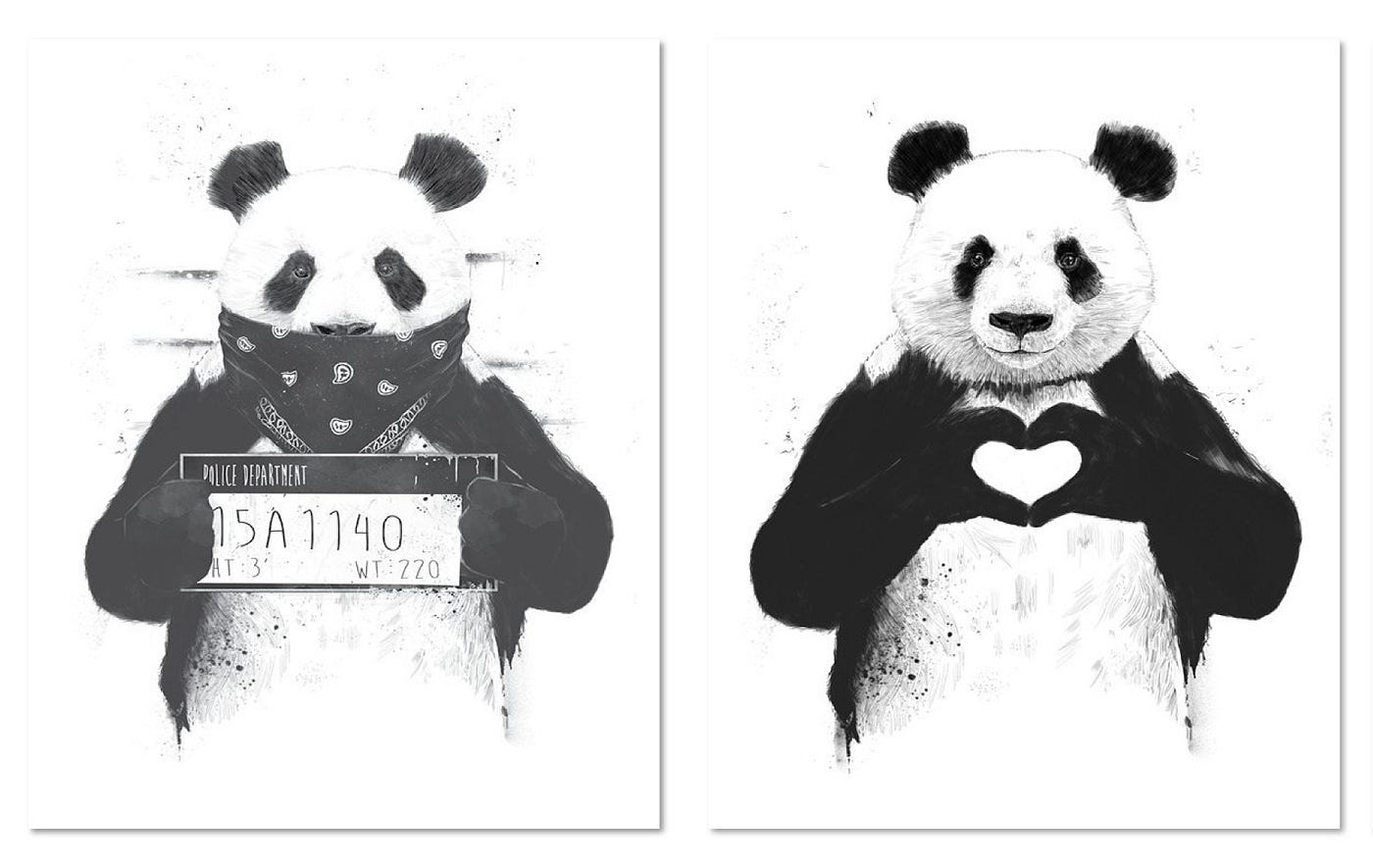
You’re supposed to hate China now. White Empire is at war with Eastasia and was always at war with Eastasia. Whatever’s happening in your country, never mind that, it’s not as bad as China. However bad conflict would be for you personally, never mind that either, it’s for the greater good. This is all bullshit of course. The hatred of China is manufactured.
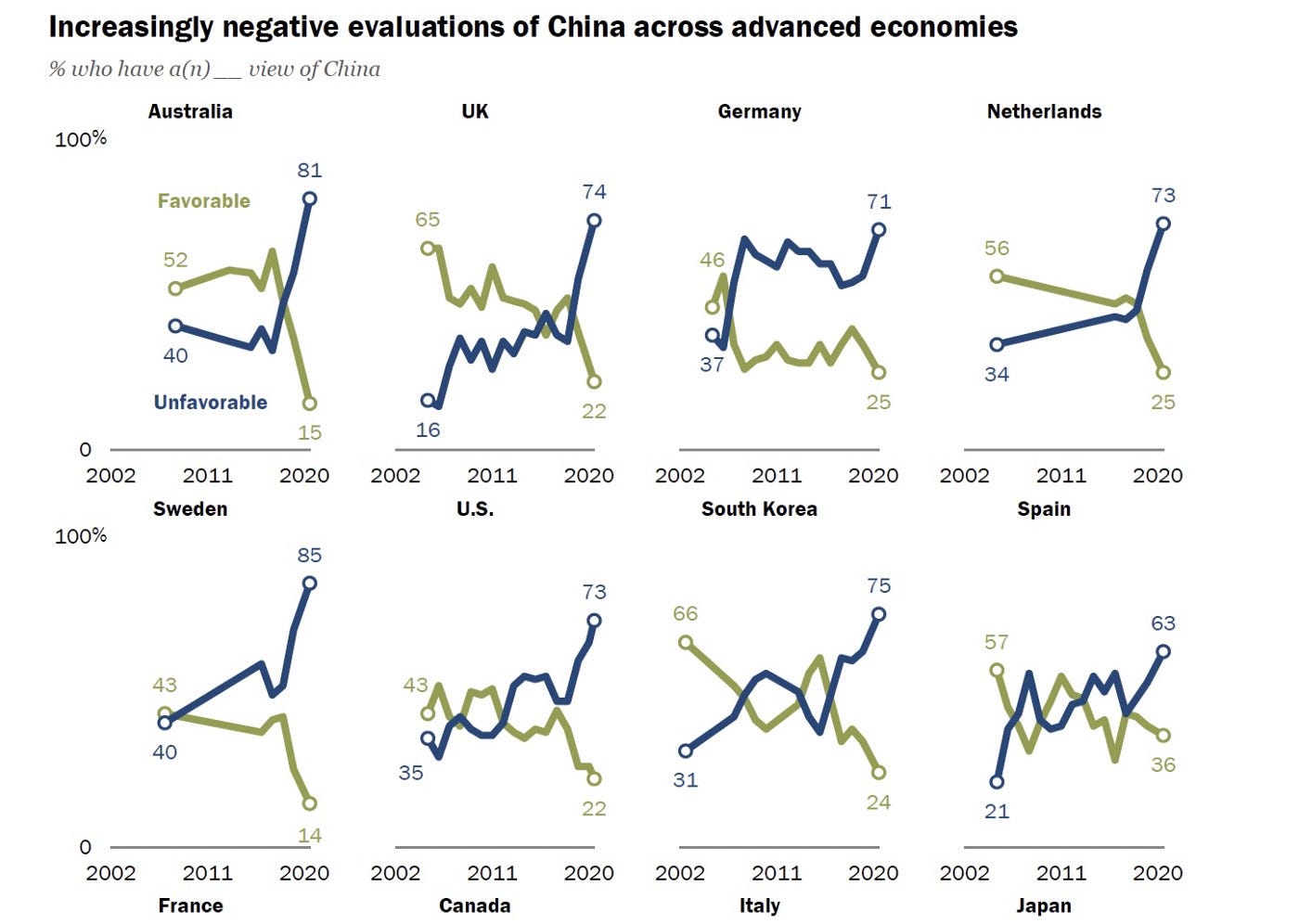
As you can see, the negative impressions of China just spike up around the time of Donald Trump and never abated. Nothing objectively happened during this time, hatred against China was just ginned up. America always needs some enemy, and China became the latest one.
It’s curious standing in the madding crowd and practicing the art of simply remembering. I’m old enough to remember when Empire wasn’t at war with China. When China was actually cool. I consumed a steady diet of imperial media gruel as a young man and I got the distinct sense that China was happening. ‘Go East Young Man’ was the sense I got and I did. I went to visit China and hung around for a month. This was in 2012, just before the frenzy began.
Then in 2016, Donald Trump et al decided that China was the enemy and the media wagged along. Given the profit incentive in creating drama somewhere, privatized propaganda is even more effective than state propaganda, both deniable and reliable. The CIA has a brainfart and shit comes out of CNN.
Now it’s 2022 and these manufactured tensions have only gotten worsen. Given the dumbass duopoly that is American politics, the Democrats dutifully continue whatever fights the Republicans start. The ruling oligarchy of arms dealers, media barons, and assorted rentiers continue their profits unabated under whatever administration.
There simply has to be some enemy to hate, and to make you grateful for your own misery, and there always is. Russia, Muslims, China, they just dust of the old racist tropes and selective anecdotes and play and replay. I’m not here to convince you, as Caitlin Johnstone says, that “China is better than the United States of America. Not because China is perfect, but because the US is quantifiably the single most destructive and murderous government on this planet by an extremely massive margin.”
If you look at this with remotely objective eyes, this is objectively true, but you can’t see clearly if you’re subsisting on imperial gruel. My point here is to invite you to deprogram yourself by changing the programming. These are recommendations for a few books, academic sources, and newsletters that you can use to learn about China directly. Even if you want to hate them this is useful. Know your enemy as Sun Tzu and Rage Against The Machine said.
Thinking
A lot of Western propaganda against China is based on them being like the West. For example, the whole debt-trap lie is based on the fact that most of the developing world actually is in dollarized debt traps, or under the financial control of colonial powers like France.
The idea that China wants to conquer the world and replace America as hegemon is based on the fact that this is all whiteness seems to understand. From the Portuguese to the Dutch to the British to the Americans, the same White Empire keeps changing hands, and they assume that China wants the same thing.
If you read any Chinese philosophy, however, they generally give zero fucks about anything outside of the Middle Kingdom. In the late 1400s they came to places like Sri Lanka, gave gifts, and then just never came back for centuries. They had stuff at home. They already knew how to season their food. They simply weren’t interested.
This is not to say that they don’t have interests, but that’s different from domination and colonization, which is a historical anomaly and a uniquely western model, borne out of western philosophy. A lot of western thinking about China is based on the assumption that they think the same, and this just isn’t true. China has its own completely different philosophy. Philosophies, really. I’m just scratching the surface here, there is constant debate now and always was throughout their history.
Ancient Philosophy
Western philosophy is so arrogant that it generally doesn’t even admit that the rest of the world even has philosophy at all. It’s just ‘the mystical aphorisms of the fortune cookie’. As Bryan Van Norden says in his important book Taking Back Philosophy:
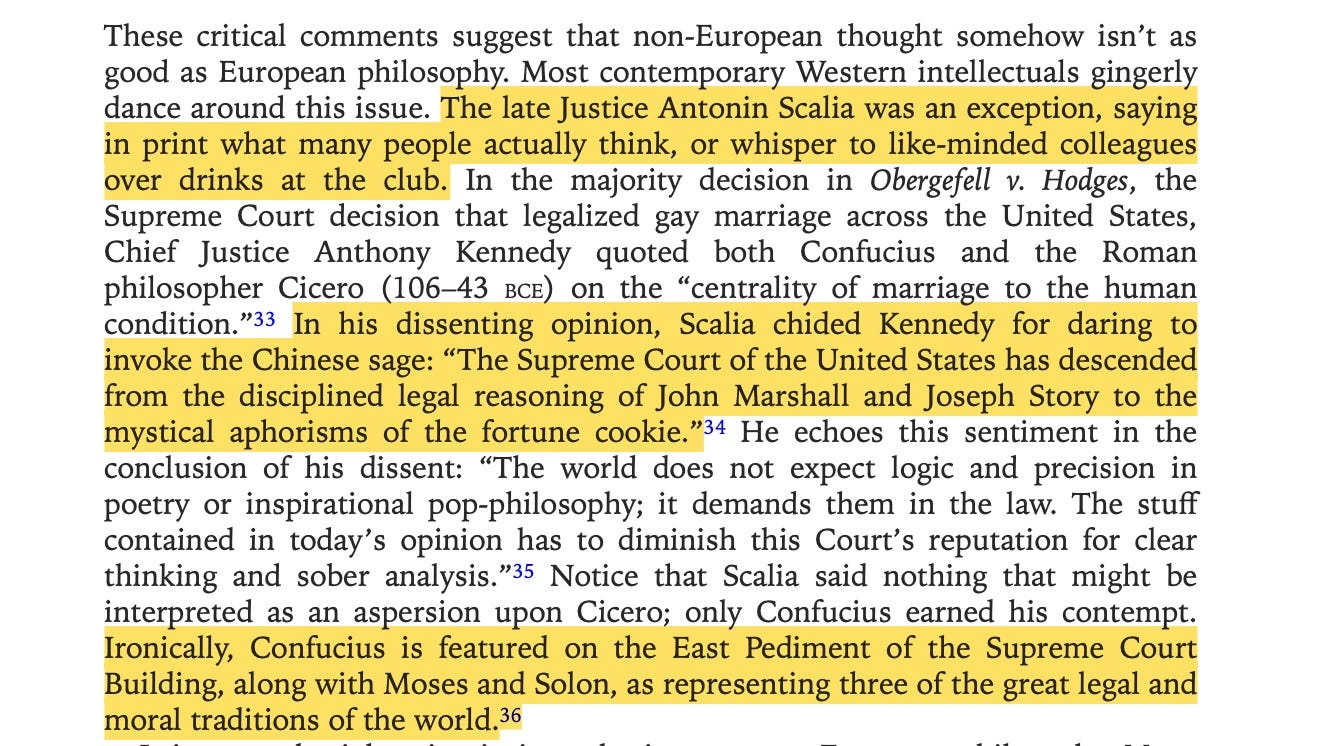
As Van Nordern says, almost all philosophy departments should actually be called “departments of Anglo-European philosophy to reflect their intentional disregard of everything outside the mainstream philosophical canon.” As Immanuel Kant said, “The race of the whites contains all talents and motives in itself.”
My point here is not to explain Chinese philosophy in general, or how it connects to the issues of the day. My point is simply to invite you to read any Chinese philosophy, to get you thinking differently. And to understand that other people might think differently, and not just be evil because a few columns of newsprint tell you so.
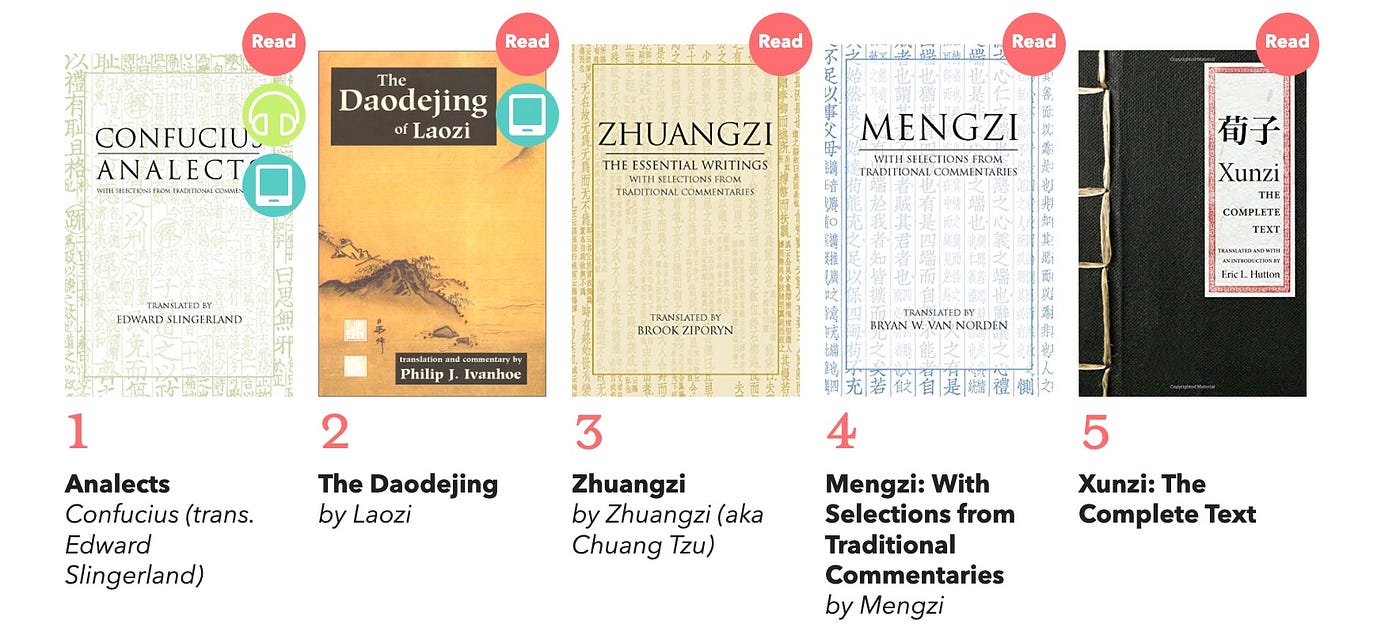
I’ve gone through 4/5 books recommended here and they have each changed my life in different ways.
- Confucius’s Analects is just a deep mind-bender, a series of riddles and subtle digs at his followers, always dancing around ‘the way’ but never showing it. Every disciple must find their own way. What comes through for me is the primacy of action and example (Confucius is always talking about ritual, and leaders modeling good behavior), which is very different from knowing and saying the right things. Confucius was all about right action.
- The Daodejing is one of the most beautiful and befuddling books I’ve ever read, and a good light starting point because it’s basically poems. But each poem has to be read and re-read, and you never quite understand them, and gods know what’s lost in translation. The Dao really feels like stepping stones in a river of knowledge, you’re only just getting your feet wet.
- Zhuangzi is probably my favorite Chinese philosophy though I agree with and understand him the least. He is just extremely radical, wondering whether he’s a butterfly or a human, decrying sages (ie, philosophers) as the root of misfortune and calling to ‘smash the jade tablets’ entirely.
- Mengzi is, to my mind, the most practical of these philosophers. He tried earnestly to get the idiots of his day to govern wisely and he has a lot of practical advice on how to manage people and a state, almost all of which went ignored then and today.
The crazy thing when you read these works is how different they are from each other, and then how much more is out there. These are all sometimes grouped under ‘Confucianism’ but that’s not one thing. Even Confucius’s living disciples had completely different interpretations. People like Mengzi and Zhuangzi are separated by centuries, and they’re all very different. And each of these philosophers is in constant debate with other philosophies, many of which (like the equally huge category Legalism) actually won the day.
The point is not that China is governed or lived according to these philosophies. These guys were rejected at the time and remain revered but misunderstood to this day. It all just gets you thinking about thinking, and how it can be so different while our problems are fundamentally the same.
As Van Nordern says, “Using the notion of a “solved game” as an analogy, we could say succinctly that “philosophy is dialogue about important unsolved problems.” Hence the point of reading philosophy is not to get answers, it’s to think of different ways to ask questions. You have to start there.
Modern Debate
There is a myth that everybody thinks the same and has to think the same in China, but there’s actually a huge range of debate, which the website Reading The China Dream helpfully maps into three categories and publishes in translation. The scholar Gan Yang calls these the ‘three traditions’:
At present, we can identify three traditions in China. One is the tradition that has taken shape after 25 years of reform… This tradition has, for the most part, grown out of the “market,” and includes many concepts with which we are all familiar today, such as freedom and rights.
Another tradition is that beginning with the establishment of the People’s Republic and that took form during the Mao Zedong era. This is a tradition characterized particularly by its emphasis on equality and justice.
Finally, of course there is also the tradition of Chinese civilization, forged over thousands of years. This is what we often call Chinese traditional culture or Confucian culture. It is often difficult to describe Chinese traditional culture, but in the everyday life of the Chinese people it is basically expressed, to put it simply, in terms of interpersonal relationships and ties of locality.
Reading The China Dream calls them Liberals, the New Left, and New Confucians, with the caveat that, “The reality is of course more complex, as there are divisions within the groups, overlapping concerns shared by members of competing groups, and any number of people who fall outside of the groups.”
My point here is that just reading through that site, you get a very different impression than this monolithic country where Xi Jinping thought is the only thought in the country. To be honest I find more introspective and incisive debate about democracy in Chinese sources than in the west. There is also plenty of criticism of their current system, including from scholars that are now in the Politburo. That scholar, Wang Huning, is actually a vital observer of America because, as the aforementioned Gan ways, quoting Hegel “What is ‘familiarly known’ is not properly known, precisely for the reason that it is familiar.”
Again, and I’ll keep repeating this, even if you hate China and want to hate China you should still read this stuff. If you’re serious about fighting an enemy you need to know them, and reading your own propaganda is just deceiving yourself. As Biggie said, never get high on your own supply. Or as Ender said in the novel Ender’s Game,
“In the moment when I truly understand my enemy, understand him well enough to defeat him, then in that very moment I also love him. I think it’s impossible to really understand somebody, what they want, what they believe, and not love them the way they love themselves. And then, in that very moment when I love them — I destroy them.”
Hence even if this is your goal, and I think it’s a terrible goal, you should still read modern thinking from China, and not in the idiot sense of generalizing it for a western audience, like Niall Ferguson reading one science fiction book and concluding that Chinese people are essentially an alien race that the West should be in survival mode against. I mean reading Chinese thinking in the sense of being confused, of learning something, and of changing how you yourself think.
Reading The China Dream is a deep source for this, the Chinese Voices newsletter from Dongsheng is a lighter and more frequent email, and Pekingology is a good substack on the business end. I won’t read news sources because I don’t read any. In my opinion, it takes way too much critical energy to read the news and I’d rather just read an essay, a book, or stare at a tree for wisdom.
Criticism
As I’ve said, there’s a lot of criticism from within China. Read the many works from ‘Liberals’ as translated by Reading The China Dream. Dongsheng publishes stuff on abandoning COVID-Zero, for example, that I don’t agree with. This is all from within China. I’m not saying that criticism from outside China is invalid, but if it doesn’t engage with what Chinese people are actually publishing then it is invalid. This sort of criticism is just lazy and ignorant, and disrespectful of both the Chinese people and its own audience.
The critical works that I’ve recently read out of/about China recently are the novel China Dream by Ma Jian, a biting satire about venal corruption within the political elite. Then there’s the film ‘Inside Wuhan’ by Ai Weiwei, which was critical at the time, but honestly looks utopian at this point. Then there’s the graphic novel A Chinese Life, In Pictures. This describes a great cartoonist's personal experiences of famine during the Great Leap Forward, violence during the Cultural Revolution, and all the things that happened in his life.
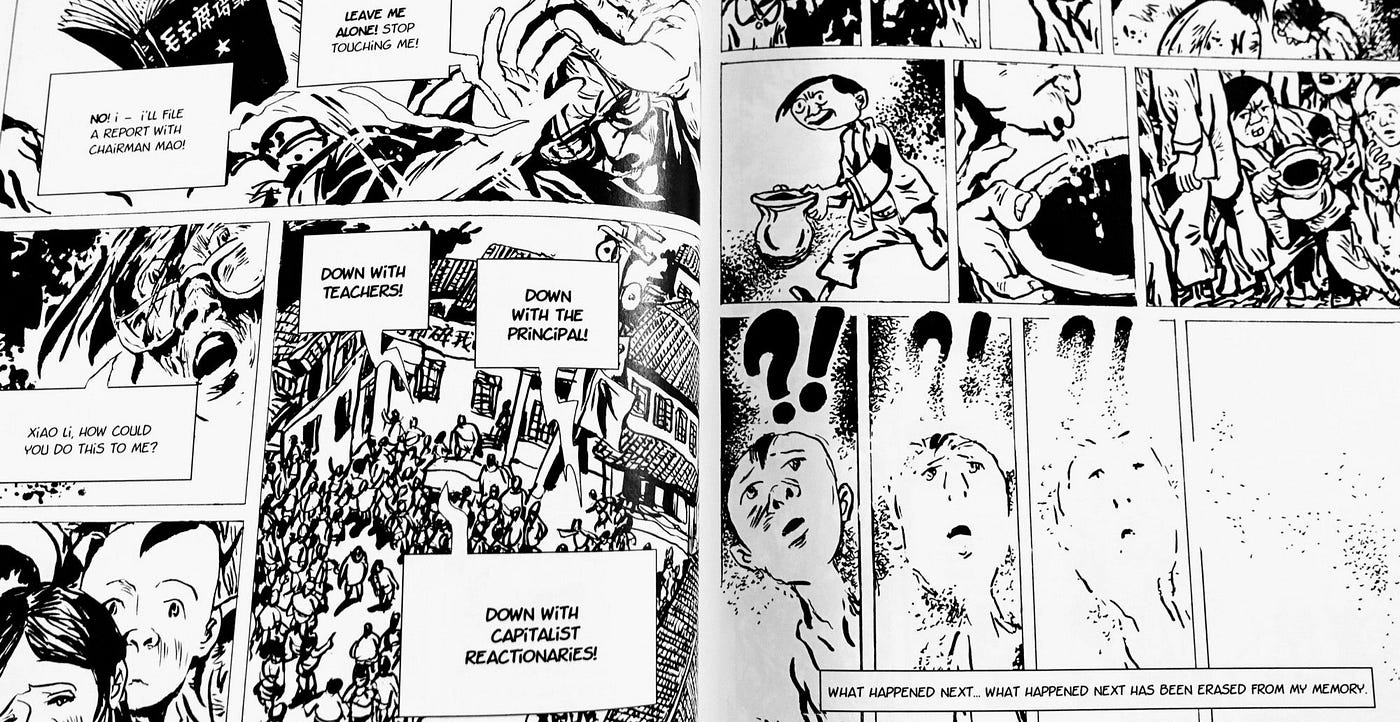
Li Kunwu (the cartoonists) does not conclude the work critically of the CPC, he says, “Those who know or can understand our misfortune must also be able to understand my profound desire for order and stability, in which I await our growth and rebirth.” However, just reading and ‘seeing’ his life you can find plenty to be critical of.
Culture
I’ll add a few things here, but this is extra credit. I guess go back in time and watch the old Journey To The West cartoons, I grew up on the picture books and still consider Sun Wukong (the Monkey King) a personal role model.
Michael Nylan’s translation of Sun Tzu’s Art Of War is excellent, but I only mention it as a shot/chaser to read the historical epic The Romance Of The Three Kingdoms, which I guess you could call a real Game Of Thrones. I see it as the Art Of War come to vivid life. For just a snapshot you can watch the films Red Cliff I and II by John Woo. It all goes well together.
There’s obviously a lot of Chinese culture, it’s over a billion people now and thousands of years of history. I got this coffee table book China: A Celebration in Art and Literature and there was an ancient poem about a father just missing his home and children. It brought me to tears. There are these simple, often mundane moments in poetry and the arts that connect you as people, across space and across time. It’s really hard to hate once you have felt intimacy that way.
Then of course there is The Three-Body Problem, Liu Cixin’s Sci-Fi masterwork that Niall Ferguson butchers in his warmongering. To me, it’s the best science fiction I’ve read recently, perhaps ever. It’s the first one that truly melted my brain since Neuromancer by William Gibson.
These are just the things I enjoy, but there is just so much to enjoy, to experience, or even to enrage. You can of course go there, but these days its so easy to just turn a page.
The Question Of China
The ‘question’ of China is so much more than what do you (the West) do about it. I personally started from a place of ignorance so I tried to read about the history I didn’t know, people I didn’t understand, culture I hadn’t experienced. So much of western media starts from answers, as if you can understand anything from a few magazine pages or minutes on the TV news. What can you understand? That something is bad and to hate it? This is a pale pantomime of understanding, a Punch and Judy show made of paper cutouts.
Even hatred of an enemy, properly understood, is a lot like love. Even if you want to approach learning this way, you can learn a lot. There are different ways to ask questions, there are debates raging right now, there are different ways to see yourself, and to see the humanity in others. Even if you want to see China as a threat and defeat it, then all the more reason to learn.
I personally don’t see it that way. I started learning about China with a lot of suspicion, but what I discovered is someplace that is incredibly complex, not intrinsically evil, and which does a lot of good. But I won’t even talk about that here. Draw your own conclusions. I am simply asking you to expand the canvas you draw on. I’ve been reading and experiencing this stuff actively for years and passively for my whole life, but literally just pick any place and start.
This is not to affect geopolitics or avert Cold War II/World War III. That shit’s already popping off, regardless of us. My point is just why live in ignorance? It’s honestly so boring. China sucks, China sucks, ok what is China? Where is China? What am I? Where am I? These are far more interesting questions.
Minds have actively, measurably been moved against China, when we all have a lot in common and a lot of delightful differences. Why live in hate? Why live in ignorance? Today so much opinion has been moved against China by a thousand opinion pieces a thousand words deeper. As the Buddha said,
Even if there be a thousand speeches—a mere collection of useless words—one useful word is better (than all that), having heard which one is pacified. (100)
The Chinese were able to imbibe the wisdom of the Buddha. Why wouldn’t we learn something, anything, from China? That’s my only exhortation here. Read a verse of the Dao, a page of a Li Kunwu comic, an email from Dongsheng, the thousand pages of The Romance Of The Three Kingdoms if you’re bold. Come back to me unmoved and immovable. You can’t. I couldn’t. Their culture is just too rich. Their sufferings are all too human. And the people calling for hatred against them are just such transparently ignorant assholes.
You’re supposed to hate China now, and they count on you being too lazy or busy to read anything further about it. And so your opinion becomes propaganda, weaponized ignorance deployed on other people in conversations and on social media. Don’t be that person. If I may summarize this article, read a fucking book.